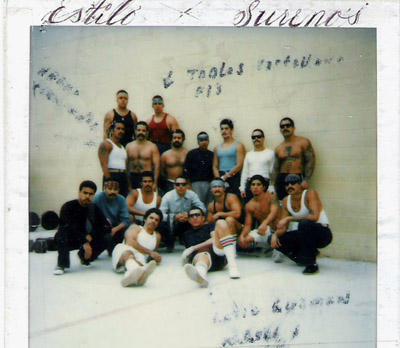The Mexican Mafia was formed in part to protect Hispanic prison inmates from other prison gangs. Prisons in California remain sharply divided along ethnic and racial lines. Rene Enriquez says gangs use the racial divide as a powerbase.
Latino inmates at San Quentin Prison in Northern California, circa 1985. Photo courtesy Rene Enriquez
Rene Enriquez: From the reality of California prison yards, gangs run the prisons. Each race has its own faction: whites, blacks and two groups of Mexicans (Latinos) - the northerners, or norteños, and the southerners, or sureños. And they run their specific groups with clearly defined norms and expected rules of behavior. To violate these rules would bring about targeting and being ostracized. And if you're targeted you're going to be assaulted. So pretty much everyone toes the line. Before it was on a voluntary basis. People participated in gang activity in prison yards if they wanted to. Since then, it's not a prison gang any longer, it's an organization. And prison is just one of its appendages. So participation now is mandatory. Any individual from Southern California who refuses to participate in the activities of the Mexican Mafia, or the mesas on the prison yards (mesas are de facto commissions that run prison yards for Mexican Mafia members locked down in solitary confinement), if they refuse to participate with these individuals, from holding knives and making knives to passing drugs and murdering people, if they refuse to participate, they're targeted and murdered. If they're not murdered, they're assaulted. If they're not assaulted they're ostracized.
American RadioWorks: So the idea here is if you're a Latino inmate from Southern California, you're either "with us or against us." If you're not with the Mexican Mafia, you're against the Mexican Mafia.
Enriquez: If you're not part of the solution, you're part of the problem. And you'll be dealt with accordingly.
Gang members are expected to follow orders and adhere to rigid discipline. They endure punishing physical workouts on the prison yard.
Enriquez: It's the mentality of the warrior. This is what we ingrain in our soldiers. To be prepared, to be physically prepared to commit battle, and to commit any violent act that is necessitated by the mafia. This is why they train so hard. This is why they endure what they do in the workouts. You have to understand that all the organizations, non-traditional organized crime and prison gangs, utilize this mentality, ... cultural identity, the philosophy and the belief that they are elite warriors. And this is part of the indoctrination process, part of the brainwashing process. Make them believe that they're elite, ... lead them down the path that they are committing these acts for a greater cause.
California has the largest inmate population of any state prison system in America. Enriquez says prison staff is hard-pressed to deal with the sheer number of gang members operating in the system.
Enriquez: We know that the resources of the California Department of Corrections are limited. For example, there's only one institutional gang investigator at Pelican Bay State Prison. That's a prison with thousands of inmates. And we're talking about more than 170,000 inmates in California's prisons. They can't investigate every one of them. Only the most visible, the most high-profile inmates are targeted. Others get away with whatever they want. (They) order murders, order racketeering activities, distribute narcotics. All of these things are done in meetings with visitors and through correspondence and legal mail.
Enriquez and other Mexican Mafia made money in prison by taxing street gangs, or crews, for their drug sales. The drug money was sent directly into the inmates' trust accounts, which were administered by the prison system. He explains the system.
Enriquez: Say I have a (street) crew member who sends me $1,000 a month, $500 every two weeks, depending on what he does. You have multiple individuals like this sending you money, usually in checks or money orders through the mail. We have an absolute right to receive moneys which are placed in our inmate trust account. I can receive any number of checks that I want. These are then deposited into the Pelican Bay trust account. I then have a right and an option to invest this money in an interest-bearing account at Bank of America. I can also buy CDs with Bank of America. I can also buy bonds with the Treasury Department, which I did up at Pelican Bay State Prison. So we're actually laundering this money. When we get too much money in our prison bank account we submit for a state draft. It's almost like writing a check. You send it into the trust office, they take X amount out of your books, and send it to your family member. So we launder money all day long with the assistance of the California Department of Corrections.



